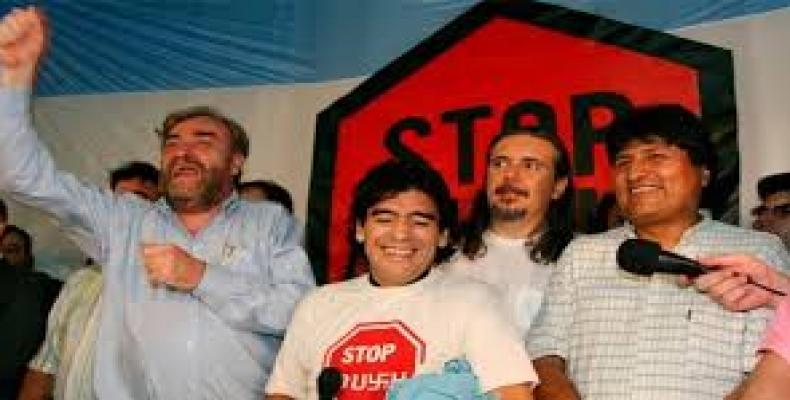The Free Trade Area of the Americas (FTAA) or Spanish: Área de Libre Comercio de las Américas or ALCA, was a proposed agreement to eliminate or reduce the trade barriers between all countries in the Americas, excluding Cuba.
In the last round of negotiations, trade ministers from 34 countries met in Miami, Florida, in November 2003. The proposed agreement was an extension of the North American Free Trade Agreement (NAFTA) between Canada, Mexico, and the United States. Opposing the proposal were Cuba, Venezuela, Bolivia, Ecuador, Dominica, and Nicaragua, all of which entered the Bolivarian Alternative for the Americas in response, and Mercosur member states.
A vocal critic of the FTAA was Venezuelan president Hugo Chávez, who has described it as an "annexation plan" and a "tool of imperialism" for the exploitation of Latin America. As a counterproposal to this initiative, Chávez promoted the Bolivarian Alternative for the Americas, ALBA, based mostly on the model of the Eurasian Economic Community, which emphasizes energy and infrastructure agreements that are gradually extended to other areas finally to include the total economic, political and military integration of the member states.
Also, Evo Morales of Bolivia has referred to the U.S.-backed Free Trade Area of the Americas, as "an agreement to legalize the colonization of the Americas."
The then presidents of Brazil, Luiz Inácio Lula da Silva, and Argentina, Néstor Kirchner, demanded that the agreement provide for the elimination of U.S. agriculture subsidies, the provision of effective access to foreign markets and further consideration towards the needs and sensibilities of its members.
One of the most contentious issues of the treaty was with concerns to patents and copyrights. Intelligent appraisal of ALCA can see that if the measures proposed by the United States were implemented and applied this would reduce scientific research in Latin America.
On the left-wing Council of Canadians web site, once commentator wrote "This agreement sets enforceable global rules on patents, copyrights and trademark. It would permits the practice of patenting plants and animal forms as well as seeds. It promotes the private rights of corporations over local communities and their genetic heritage and traditional medicines".
In 2010, when many Mexicans bitterly recalled the sad effects of the first decade of life of the Free Trade Treaty of the Americas or NAFTA, further south in the Hemisphere criticism increased against what was perceived as a prolongation of that infamous agreement, ALCA.
Amidst a strong conservative offensive in Latin America aimed at recovering controls lost to progressive governments, Cuba hosted the Hemispheric Meeting on the Defeat of the Area of Free Commerce of the Americas or ALCA 10 years ago.
Delegates from twenty hemispheric nations attended the meeting.
In a messages on the forty fifth anniversary of the Cuban Revolution, Fidel Castro recalled that ALCA would be unsustainable both to the peoples of Latin America as well as to the United States.
Fidel stated that ALCA would open the door to artificially cheaper US products that would ruin Latin American producers and leave the northern producers in full control of the hemispheric markets.
In view of the strong opposition to ALCA, the United States then decided to propose another domination scheme, known as the “soft ALCA”, meaning bilateral agreements on free trade. But nothing doing! Ten years after saying NO to the US ALCA scheme, progressive Latin Americans and Caribbean state evaluate that decision as highly positive in the battle for full control of Latin American and Caribbean markets.


